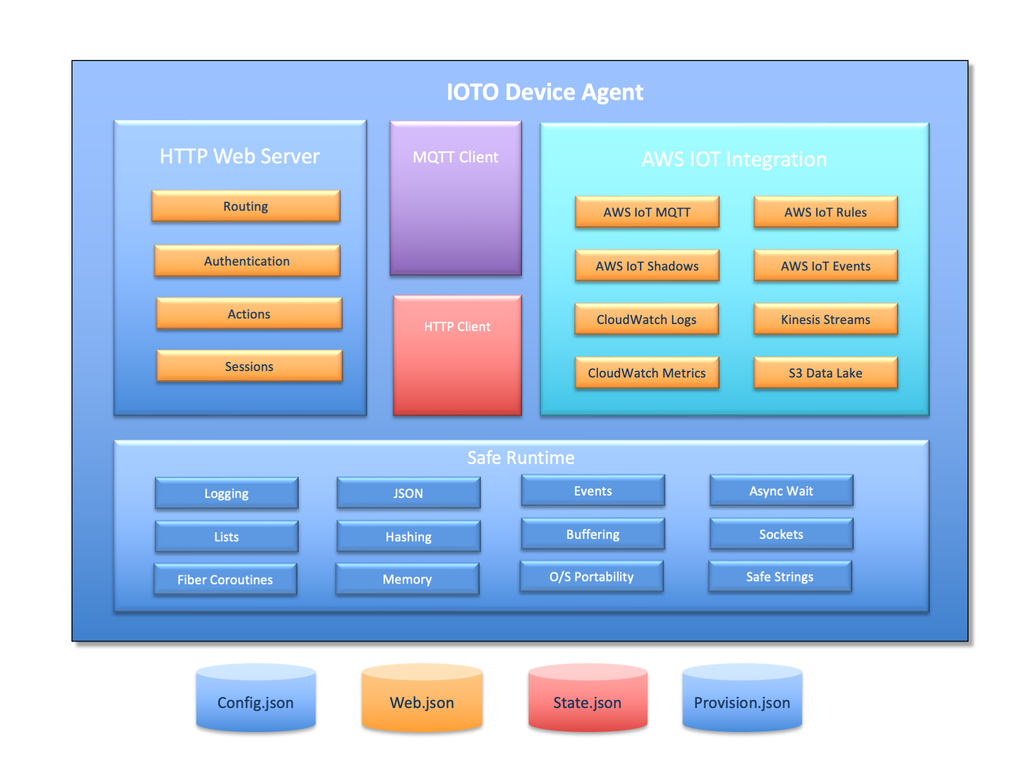Ioto Safe Runtime (R)
Ioto is built upon a safe portable runtime (R). This layer insulates the rest of Ioto from the underlying platform and allows it to be highly portable to new operating systems or hardware.

The safe runtime provides a suite of services that facilitate the creation of high performance, non-blocking management applications by providing: fiber coroutines, lists, hashing, safe strings, buffering, timers, events, networking, buffer management and JSON parsing.
The safe runtime provides a more secure environment in which to program as it replaces 'C' APIs that are prone to buffer overflows and other similar security exploits. The safe runtime includes a fast, safe string library that supports a secure programming style.
Ioto Types
The Ioto Agent uses an operating system dependent layer called "osdep".
By including "osdep.h", you gain access to these cross-platform types. Some types are implemented natively on some platforms and others are provided by "osdep".
Quick Tour
Here are some primitive data types:
bool b;
int8 i8;
int16 i16;
int32 i32;
int64 i64;
uint8 u8;
uint16 u16;
uint32 u32;
uint64 u64;
schar c; // Signed char
uchar c; // Unsigned char
cchar c; // Const char
cuchar c; // Const unsigned charOther useful types:
ssize length; // 64-bit signed length
Time time; // Time in milliseconds since Jan 1, 1970
Ticks ticks; // Elapsed time in system millisecond ticks (never goes backwards)For a full list of the osdep types, see: OSDEP API
Return Values
Many Ioto APIs return an integer value that is zero for success and otherwise set to a negative error code.
Here are the return codes used by the Ioto runtime:
#define R_ERR_OK 0
#define R_ERR_BASE -1
#define R_ERR -2
#define R_ERR_ABORTED -3
#define R_ERR_ALREADY_EXISTS -4
#define R_ERR_BAD_ACK -5
#define R_ERR_BAD_ARGS -6
#define R_ERR_BAD_DATA -7
#define R_ERR_BAD_FORMAT -8
#define R_ERR_BAD_HANDLE -9
#define R_ERR_BAD_NULL -10
#define R_ERR_BAD_REQUEST -11
#define R_ERR_BAD_RESPONSE -12
#define R_ERR_BAD_SESSION -13
#define R_ERR_BAD_STATE -14
#define R_ERR_BAD_SYNTAX -15
#define R_ERR_BAD_TYPE -16
#define R_ERR_BAD_VALUE -17
#define R_ERR_BUSY -18
#define R_ERR_CANT_ACCESS -19
#define R_ERR_CANT_ALLOCATE -20
#define R_ERR_CANT_COMPLETE -21
#define R_ERR_CANT_CONNECT -22
#define R_ERR_CANT_CREATE -23
#define R_ERR_CANT_DELETE -24
#define R_ERR_CANT_FIND -25
#define R_ERR_CANT_INITIALIZE -26
#define R_ERR_CANT_LOAD -27
#define R_ERR_CANT_OPEN -28
#define R_ERR_CANT_READ -29
#define R_ERR_CANT_WRITE -30
#define R_ERR_DELETED -31
#define R_ERR_MEMORY -32
#define R_ERR_NETWORK -33
#define R_ERR_NOT_CONNECTED -34
#define R_ERR_NOT_INITIALIZED -35
#define R_ERR_NOT_READY -36
#define R_ERR_READ_ONLY -37
#define R_ERR_TIMEOUT -38
#define R_ERR_TOO_MANY -39
#define R_ERR_WONT_FIT -40
#define R_ERR_WOULD_BLOCK -41
#define R_ERR_MAX -42NULL Tolerance
Ioto adopts a technique call NULL tolerance where APIs, wherever possible, tolerate NULL arguments and attempt to do something reasonable with their arguments, rather than crashing the applications.
The standard C library is not NULL tolerant. If you pass a NULL pointer to routines such as as free() or strlen() your program will crash.
The Ioto memory allocator is NULL tolerant when calling rFree. Similarly, Ioto provides a safe string library that will accept NULL arguments wherever possible. In the case of strlen, Ioto provides slen() which will return zero if passed a NULL pointer.
